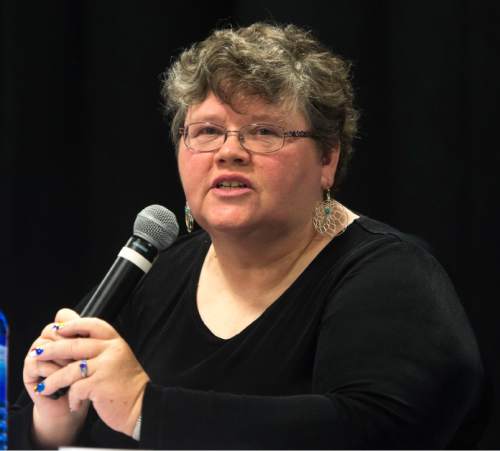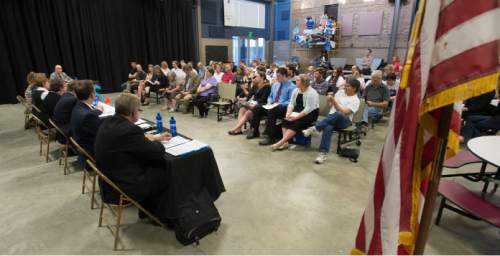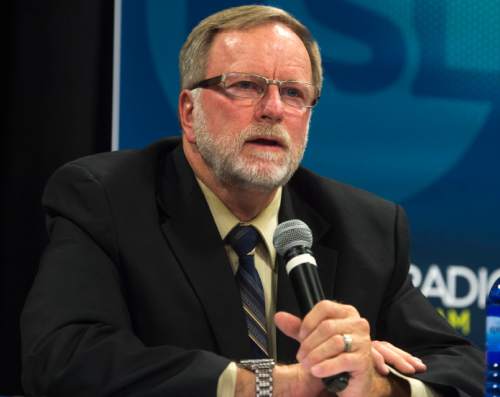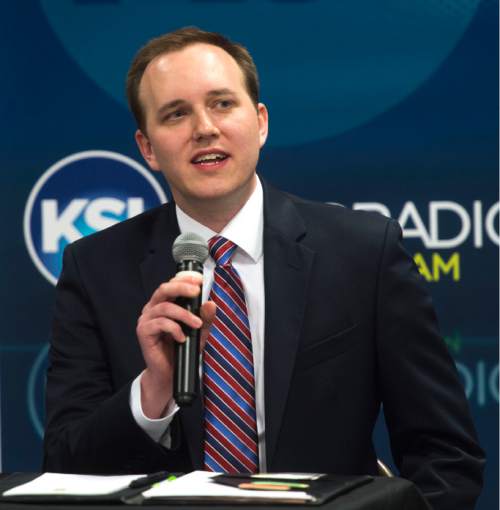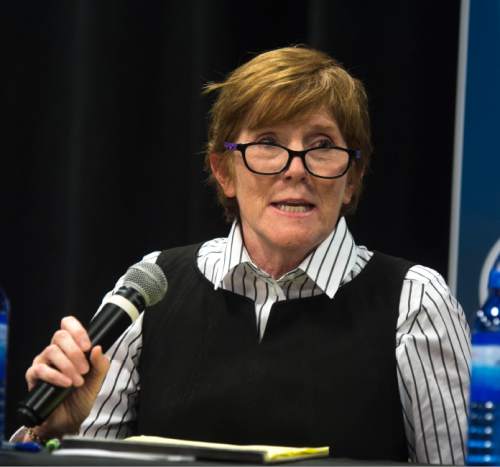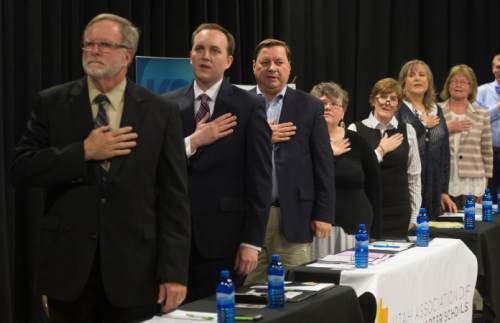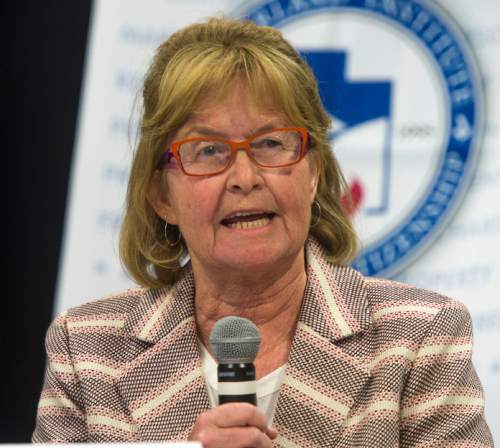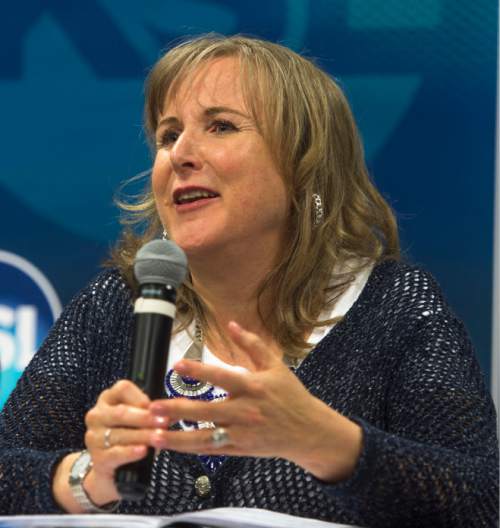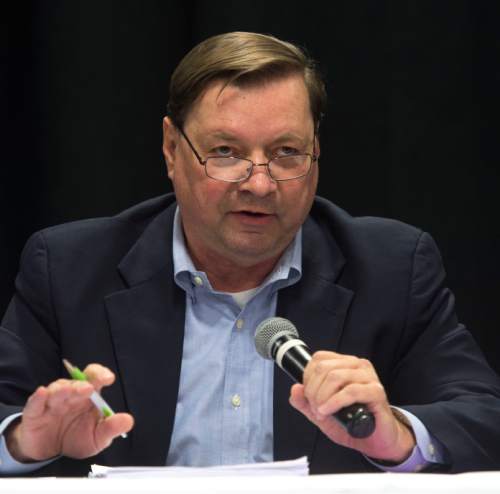This is an archived article that was published on sltrib.com in 2016, and information in the article may be outdated. It is provided only for personal research purposes and may not be reprinted.
Utah's treatment of public school educators was the focus of a Wednesday evening debate among candidates for the state school board.
Seven candidates, vying to represent Salt Lake City and part of Wasatch County on the board, discussed teacher salaries, licensing, unions and the shortage of trained educators willing to work in Utah classrooms.
Data from the Utah Office of Education shows that 42 percent of new Utah teachers leave the profession within five years.
And Carol Barlow-Lear, an attorney and former educator running for the District 7 seat on the state school board, said she is one contributor to that statistic.
"I did it for five years," Barlow-Lear said. "It is the most difficult, most emotionally exhausting, most intellectually exhausting job I've ever had."
Wednesday's event, held at the Salt Lake Arts Academy, was the third in a series of school board debates sponsored by the Utah Association of Public Charter Schools, the Sutherland Institute, the Hinckley Institute of Politics and KSL.
It featured two current educators, East High School teacher Frank Langheinrich and Bountiful Elementary teacher Laurie Williams, who stressed the importance of including classroom professionals in policy discussions.
"We need to have teachers in high positions who are making decisions," Williams said, "like on the [state school] board, who are actual teachers who go home the next day and teach."
Several candidates spoke of the need for better pay in public education.
But they were divided on a new school board policy that will allow people with professional experience in an academic subject — but not education training — to enter the classroom under the tutelage of a veteran educator.
Businessman Dan Tippetts said the policy is a good short-term solution to Utah's teacher shortage, but should be combined with increased salaries to retain effective educators long term.
"We need to pay them more," he said. "We need to be able to have them have a reasonable life outside of work."
And Frank Strickland, a geologist, said that too often, funding bumps for teacher salaries are absorbed by benefits costs and scheduled raises for school veterans.
"When the Legislature appropriates money for salary increases, we need to make sure that it winds up in actual increases and take-home pay," he said.
The candidates also were asked for their views on the Utah Education Association (UEA), the state's largest teachers union, and whether the organization represents a stakeholder for the board to collaborate with.
Only Barlow-Lear received a UEA endorsement in the District 7 race, and incumbent Leslie Castle has come under fire from the union for her positions on teacher discipline and alternative licensing programs.
Castle said everyone in Utah has a stake in the state's public education system, but she added that the UEA sometimes puts the needs of teachers over the needs of students.
In particular, she said the union has at times made it difficult for the state school board to revoke a teacher's license as a punishment for misconduct.
"UEA is pretty heavy-handed with us as a state board when we try to do that," she said.
Langheinrich said the state and local district teachers union play valuable roles in advocating for educators and communicating their concerns to policymakers at the state level.
"They're a great lobbyist for us," he said. "But more important than that is the way we funnel information from where the rubber hits the road to a statewide organization."
Strickland said the interests of teachers unions have to be balanced against the concerns of Utah parents.
"If [education] is cut loose from the parents, we have problems," he said, "because then it is cut loose from accountability."
Candidates also were asked about SAGE testing and Common Core, which are commonly mistaken as federal programs and have become a regular source of division and controversy in schools.
Williams spoke in favor of the Common Core, which outlines grade-level expectations in math and English and which were adopted by most states with encouragement from national experts and the U.S. Department of Education.
"It does need to be tweaked," Williams said. "But it is a really good, rigorous set of standards."
She said the computer-based SAGE test is too time consuming and challenging for students who are uncomfortable with technology. She also stressed that teachers, like her, should be consulted before major changes were made.
"I would like the SAGE cut by one-third to one-half," she said. "I'm the only person up here who has actually seen a live SAGE [test]."
The state school board recently voted to end SAGE testing for high school students and to conduct a full review of Common Core if lawmakers provide additional funding and make necessary adjustments to state law.
Castle was a board member when Utah adopted the Common Core in 2010.
She reiterated her support for standards-based education — which dictates what students are expected to learn, but not how educators are expected to teach — and compared it to the benefit of standard tire sizes if a Utah driver gets a flat in Ohio.
"It's nice to have standardization in education that allows a student to leave their school without falling into chaos," she said.
Barlow-Lear said a campaign of misinformation has been successful against Utah's standards, resulting in the name Common Core being "hopelessly poisoned."
"The big lie has won," she said.
Teuscher said it likely is inevitable that Utah will abandon the Common Core. If that happens, she said, the state would benefit from looking to other states and nations rather than relying solely on Utahns to draft replacement standards.
"I hope we won't have to invent the wheel," she said.
The candidates for District 7 first will face off in the state's primary election on June 28, with the top two vote recipients advancing to November's general election. Additional school board debates will be held Thursday and Saturday in Murray and South Jordan, respectively, followed by a Wednesday debate in Draper and a June 23 debate in Orem.
Additional information is available at utahcharters.org.
Twitter: @bjaminwood


